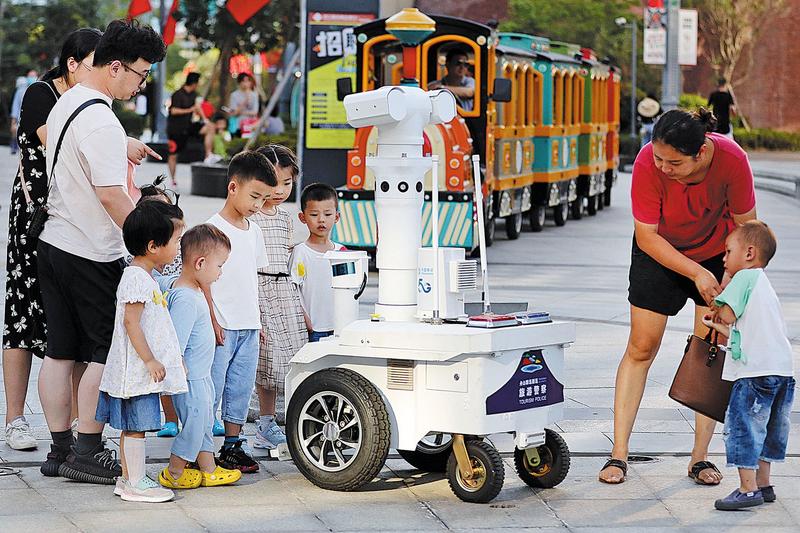 A visitor tries smart equipment at an AI innovation and application summit in Jinan, East China's Shandong province, on April 19, 2021. (PHOTO / XINHUA)
A visitor tries smart equipment at an AI innovation and application summit in Jinan, East China's Shandong province, on April 19, 2021. (PHOTO / XINHUA)
BEIJING - China's State Council Information Office on Monday issued a white paper titled "Jointly Build a Community with a Shared Future in Cyberspace."
The white paper introduced China's vision of internet development and governance in the new era and its actions, shared its achievements in promoting the building of a community with a shared future in cyberspace, and outlined the prospects for international cooperation.
It explained China's proposal to build a closer community with a shared future in cyberspace in terms of cyberspace development, governance, security and cooperation, Cao Shumin, deputy head of the Cyberspace Administration of China (CAC), told a press conference on the release of the white paper.
A white paper published by China's State Council Information Office called it the responsibility of all of humanity to develop, use, and manage the internet well and make it more beneficial to mankind
The internet has turned the world into a global village, and the international community is becoming more and more interconnected, with a shared future becoming more apparent, the white paper showed.
The white paper called it the responsibility of all of humanity to develop, use, and manage the internet well and make it more beneficial to mankind.
As the world's largest developing country and the country with the largest number of internet users, China "understands the underlying trends of the information age; upholds a people-centered approach; and supports global governance based on extensive consultation, joint contribution, and shared benefits," read the paper.
In the new development stage and guided by the new development philosophy, China is building a new development dynamic, it said.
China is set to build up its strength in cyberspace and digital technologies, said the white paper, noting that progress has been made in boosting the digital economy, building a clean and sound online environment, and guarding against risks to cyberspace security.
 Visitors check out a digital printer manufactured by JHF Technology Group at an expo in Shanghai in 2021. (PHOTO PROVIDED TO CHINA DAILY)
Visitors check out a digital printer manufactured by JHF Technology Group at an expo in Shanghai in 2021. (PHOTO PROVIDED TO CHINA DAILY)
Community with a shared future in cyberspace essential
Building a community with a shared future in cyberspace is essential in the information age, according to the white paper.
With the rapid development of global information technology, the internet has penetrated into all aspects of human life and work. As a consequence, humanity is increasingly confronted with development and security challenges in cyberspace, which must be addressed through joint efforts, the white paper showed.
With the rapid development of global information technology, the internet has penetrated into all aspects of human life and work. As a consequence, humanity is increasingly confronted with development and security challenges in cyberspace, which must be addressed through joint efforts, according to the white paper
The community with a shared future in cyberspace is an important part of a global community of shared future, according to the white paper.
Related concepts and proposals on development, security, governance and universal benefits are in conformity with the concepts of a global community of shared future and the distinctive features of cyberspace; and promoting a community with a shared future in cyberspace will provide abundant digital impetus, a solid security safeguard, and a broader consensus on cooperation to this end, it added.
ALSO READ: White paper: China's BeiDou reaches world-class level
"To build a community with a shared future in cyberspace, we should hold to a vision of extensive consultation, joint contribution and shared benefits in global governance, and promote a multilateral, democratic and transparent international internet governance system. We strive to realize the goals of innovation-driven development, security, order, equality, respect, openness, and shared interests in cyberspace, so that cyberspace will be a community that benefits all of humanity," the white paper showed.
In doing so, basic principles including respecting cyber sovereignty, safeguarding peace and security, promoting openness and cooperation, and maintaining good order should be adhered to, noted the white paper.
Digital economy: China's major growth engine
The country's digital economy, ranking second worldwide for many years, has become a major growth engine for the country, according to the white paper.
By 2021, the value of China's digital economy had reached 45.5 trillion yuan, accounting for 39.8 percent of its GDP, the white paper showed.
By June 2022, there were 1.05 billion internet users in China, and the internet penetration rate had reached 74.4 percent, read the white paper, adding that the country hosts the world's largest 5G network and becomes one of the global leaders in 5G standards and technology, with 1.85 million 5G cell towers and 455 million 5G cell phone subscribers.
 People check out a 5G intelligent robot patroller at a commercial area in Zhoushan, Zhejiang province, in October 2021. (ZOU XUNYONG / FOR CHINA DAILY)
People check out a 5G intelligent robot patroller at a commercial area in Zhoushan, Zhejiang province, in October 2021. (ZOU XUNYONG / FOR CHINA DAILY)
According to the white paper, China vigorously cultivates new technologies and applications such as artificial intelligence, Internet of Things and next-generation communication networks to accelerate the transformation from digitalization and network-based service to artificial intelligence in various economic and social sectors. Innovation has become a defining feature in the country
With the BeiDou-3 global navigation satellite system now operational, and beginning to provide global services in July 2020, the BeiDou industrial system is in place and provides notable economic and social benefits, the white paper showed, adding that China's satellite navigation and positioning services generated 469 billion yuan of industrial output in 2021.
ALSO READ: Full Text: China's BeiDou Navigation Satellite System in the New Era
According to the white paper, China vigorously cultivates new technologies and applications such as artificial intelligence, Internet of Things and next-generation communication networks to accelerate the transformation from digitalization and network-based service to artificial intelligence in various economic and social sectors. Innovation has become a defining feature in the country.
Noting China's industrial internet has grown rapidly, and the digital transformation of manufacturing industry continues, the white paper showed that 55.3 percent of the key processes of large industrial enterprises had become digitally controlled, and the application of digital R&D tools was as high as 74.7 percent by February 2022.
China's digital transformation of agriculture is making steady progress. 5G, the IoT, big data and AI have been applied in agricultural production and management, and key technological development and innovative application research for intelligent agriculture and farming machinery have been strengthened, according to the white paper.
Digitalization and the provision of digital capacity continue to grow. E-commerce is flourishing, the white paper noted.
ALSO READ: China remains world's largest online retail market
In 2021, China's online retail sales of consumer goods stood at 10.8 trillion yuan, up 12 percent year-on-year. The turnover in China's cross-border e-commerce reached 1.92 trillion yuan, up 18.6 percent year-on-year. The scale of third-party payment transactions continues to expand.
 A tractor equipped with the Beidou Navigation Satellite System plants cotton in a field in Xinjiang on March 31. (CHEN JIANSHENG / FOR CHINA DAILY)
A tractor equipped with the Beidou Navigation Satellite System plants cotton in a field in Xinjiang on March 31. (CHEN JIANSHENG / FOR CHINA DAILY)
China's digital transformation of agriculture is making steady progress. 5G, the IoT, big data and AI have been applied in agricultural production and management, and key technological development and innovative application research for intelligent agriculture and farming machinery have been strengthened, according to the white paper
New methods have been introduced to upgrade commercial models of the service industry, and internet-based medical services, online education, and remote working have accelerated the digitalization of the service industry, the white paper added.
Help people in different countries, regions
Meanwhile, China is committed to helping people in different countries and regions share the benefits of the internet, according to the white paper.
The country upholds "Tech for Good" with a people-centered approach. In response to the needs of the international community, China has worked with other countries to bridge the digital divide. It has promoted online cultural exchanges and mutual learning among civilizations and strengthened support for vulnerable groups to help people in different countries and regions share the benefits of the internet, the white paper showed
It has also engaged in active cross-border collaboration in terms of the digital economy, cyberspace security, and reform and development of global cyberspace governance to promote inclusive development of the internet, according to the paper, noting that all these efforts contribute to building a community with a shared future in cyberspace.
While using the internet to eliminate its own poverty, China has used technology to help developing countries improve broadband access in the poorest areas and areas with low population density. It has worked to provide universal and affordable internet access in the least developed countries, in order to eliminate poverty caused by lack of network facilities, according to the white paper.
READ MORE: With AI and e-cars, China crafts green-tech megalopolis
China has actively developed digital public products and expanded cooperation in digital public services. Since the global outbreak of COVID-19, pandemic forecasting platforms and robocalls developed in China have helped control and mitigation in other countries, read the white paper.
Calling the internet the shared home of all of humanity, the white paper said it is the common responsibility of the international community to make this home cleaner, safer, and more prosperous.
Online cultural exchange platforms have been created for exchange and mutual learning among civilizations, the white paper showed.
The white paper stated China's readiness to work with other countries to foster an open, inclusive, and vibrant cyberspace that is fairer, more secure, and more stable, calling for concerted efforts to build a community with a shared future in cyberspace and create a better world.


